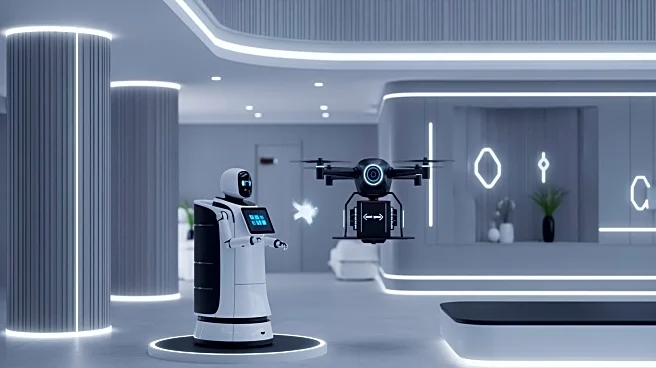What's Happening?
The hospitality industry is witnessing a transformative shift with the rise of Agent-to-Agent (A2A) communication, where AI agents from different organizations can autonomously exchange information and complete transactions. This development is expected
to streamline processes such as hotel bookings, loyalty benefits, and availability checks, eliminating the need for manual input or third-party intermediaries. The concept draws parallels to the SMTP protocol for email, which democratized communication but ultimately centralized it under major platforms. Similarly, individuals are likely to use AI agents from platforms like OpenAI, Google, or Anthropic, while corporations may develop their own systems for managed travel. This shift is crucial for hotels, as it requires them to decide which AI agents they will interact with and who will control these conversations.
Why It's Important?
The adoption of A2A communication in the hospitality sector could significantly alter the landscape of travel bookings and customer interactions. By enabling direct machine-to-machine collaboration, hotels can potentially reduce reliance on online travel agencies and enhance operational efficiency. This shift could lead to cost savings and improved customer experiences, as AI agents negotiate and finalize transactions autonomously. However, it also poses challenges in terms of data privacy, control, and the need for hotels to adapt their systems to interact with AI platforms effectively. As leisure travel continues to dominate global bookings, understanding and integrating A2A communication becomes critical for hotels to remain competitive in the evolving digital landscape.
What's Next?
Hotels and travel companies are expected to invest in AI technology to facilitate A2A communication, potentially leading to partnerships with major AI platforms. This could result in new business models and revenue streams, as well as increased competition among AI providers to offer the most efficient and secure solutions. Stakeholders in the hospitality industry will need to address concerns related to data security and privacy, ensuring compliance with regulations while leveraging AI capabilities. As the technology matures, it may also influence consumer behavior, with travelers increasingly relying on AI agents for seamless and personalized travel experiences.
Beyond the Headlines
The rise of A2A communication highlights broader ethical and legal implications, particularly concerning data ownership and the role of AI in decision-making processes. As AI agents become more autonomous, questions about accountability and transparency in transactions may arise, necessitating new regulatory frameworks. Additionally, the shift towards AI-driven interactions could impact employment in the hospitality sector, as traditional roles evolve or become obsolete. The long-term effects of A2A communication may also extend to cultural dimensions, as travelers experience more curated and automated interactions, potentially altering the nature of hospitality and customer service.

















